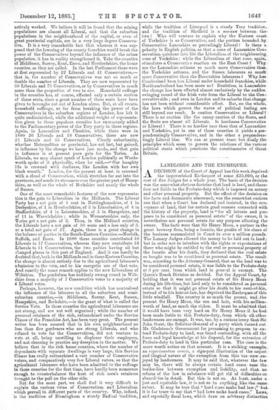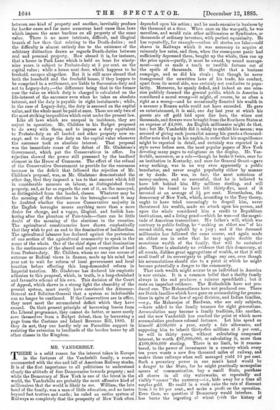LANDLORDS AND THE EXCHEQUER.
ADECISION of the Court of Appeal has this week deprived the impoverished Exchequer of some £25,000, or the cost of five Judges for a whole year. The basis of the decision
was the somewhat obvious doctrine that land is land, andehere- fore not liable to the Probate-duty which is imposed on money and other personal property. But the effect of the decision on the facts and documents concerned, was the somewhat. curious one that when a Court has declared and insisted, in the cone veyanee of land, that for certain good reasons connected with
the history of the property, land is "for all intents and. pur- poses to be considered as personal estate" of the owner, it is nevertheless not personal estate for any purpose affecting. the owner. The facts were that Sir Henry Meux, a partner bathe. great brewery firm, being a lunatic, the profits of his share of
the business accumulated in Court to over a million pounds. The Lunacy Judges allowed the money to be laid out in land; but in order not to interfere with the rights or expectations of those who might be entitled to the real or personal property of the lunatic after his death, they deelared that the real estate so bought was to be considered as personal estate. The result was, according to the Attorney-General, that as the land was to be considered personal estate, it was liable to the Probate-duty at 3 per cent. from which land in general is exempt. The Queen's Bench Division so decided. But the Appeal Court, by holding that it was not personal estate of Sir Henry Meux during his life-time, but land only to be considered as personal estate so that it might go after his death to his next,,of-kin, instead of to his heir-at-law, has deprived the Exchequer of this little windfall. The country is so much. the poorer, and. -the present Sir Henry Meux, the son and heir, with hisitnillion- worth of land, so much the richer. It must be admitted that it would have been very had on Sir Henry Meux if he had been made liable to this Probate-duty, from which alLother landowners are exempt. It was, too, by a curious irony that Sir John Gorst, the Solicitor-General of a party which turned out Mr. Gladstone's Government for presuming to propose. to. ex- tend Probate-duty to land, was found contending, with all the force and legal knowledge at his disposal, for the extension of Probate-duty to land in this particular case. The case is the more worth notice on that account. It is a striking example, an experimentum crucis, a sign-post illustration. of the unjust
and illogical nature of the exemption from this' tax :now -en- joyed by landowners. It may be said that, whatever the 'Jaw may be, there will be always certain hard eases - neaat the border-line between exemption and liability, and that, no reform of the law. in substance will get rid: of difficulties ex• absurdities in detail. But this, is not so. At least, under -a just and. equitable law, it is not so to anything, like :the .eame. extent. It may be true that " hard cues make. bad latv.;" -but. it is far truer-to say that:" bad laws make bath cases."' Laws, and especially fiscal laws, which draw an arbitrary distinction
between one kind of property and another, inevitably produce far harder cases and far more numerous hard cases than laws which impose the same burdens on all property of the same value. There is no more intricate, difficult, and illogical branch of law than that relating to the Death-duties ; and the difficulty is almost entirely due to the existence of the arbitrary distinction drawn as regards Death-duties between real and personal property. How absurd it is, for instance, that a house in Park Lane which is held on lease for ninety- nine years, is subject to Probate-duty at 3 per cent. on the capital value ; while a house next door, which happens to be freehold, escapes altogether. But it is still more absurd that both the leasehold and the freehold house, if they happen to be comprised in a settlement, are liable to Succession-duty and not to Legacy-duty,—the difference being that in the former case the value on which duty is charged is calculated on the life-interest of the successor even when he takes an absolute interest, and the duty is payable in eight instalments ; while, in the case of Legacy-duty, the duty is assessed on the capital value, and the whole must be paid at once. These are only two of the most striking inequalities which exist under the present law. Like all laws which are unequal in incidence, they are unjust in operation. Mr. Childers in his Budget proposed to do away with them, and to impose a duty equivalent to Probate-duty on all landed and other property now ex- empt, and to charge the duty on the capital value whenever
the successor took an absolute interest. That proposal was the immediate cause of the defeat of Mr. Gladstone's Government, which put the Conservatives in office. Its rejection showed the power still possessed by the landlord element in the House of Commons. The effect of the refusal of the Conservative Government to provide for the enormous increase in the deficit that followed the rejection of Mr. Childers's proposal, was, as Mr. Gladstone demonstrated the other day, that they imposed a tax to that amount which fell in considerable measure on labour, as distinguished from property, and, as far as regards the rest of it, on the moneyed, as distinguished from the landed, classes. Whatever may be the meaning of the elections in the bcfroughs—and it may be doubted whether the narrow Conservative majority in the English boroughs means anything more than a mere desire for change, and a vague, illogical, and foolish han- kering after the phantom of Fair-trade—there can be little doubt of the meaning of the elections in the counties. The agricultural constituencies have shown emphatically that they wish to put an end to the domination of landlordism. The agricultural labourer has declared against the pretension of one section of the agricultural community to speak in the name of the whole. One of the chief signs of that domination is the continuance of the absurd and unjust exemption of land. from Probate-duty. Mr. Childers, whom no one can accuse of extreme or Radical views in finance, made up his mind last year not to wait for reform of local government and local taxation before effecting this long-demanded reform in Imperial taxation. Mr. Gladstone has declared his emphatic adhesion to this proposal, which, in truth, is a long-cherished and favourite scheme of his own. This decision of the Court of Appeal, which shows in a strong light the absurdity of the present system, must surely have convinced the Attorney- General and Solicitor-General that a system so indefensible can no longer be continued. If the Conservatives are in office, they must meet the accumulated deficit which they have caused. On their present principle of borrowing leaves from the Liberal programme, they cannot do better, or more surely save themselves from a Budget defeat, than by borrowing a page from the Customs and Inland Revenue Bill, 1885. If they de not, they can hardly rely on Parnellite support in resisting the extension to landlords of the burden borne by all other classes in the Kingdom.



















































 Previous page
Previous page